

Collaborative Sites for Learners. What Is It Like to Be Bilingual? Practically everyone has an opinion about the advantages and inconveniences of being bilingual - educators, psychologists, linguists, sociologists - even if they are not bilingual themselves.

With the aid of two short surveys, and many personal testimonies, I propose we let bilinguals tell us what it is like to be bilingual. The dominant picture that emerges is that bilinguals are quite positive about their bilingualism. A first advantage they put forward concerns the ability they have to communicate with different people, of different cultures, in different countries. Linked to this is the fact that being bilingual allows you to read more (if you are literate in several languages naturally) and to sometimes express yourself with greater clarity and with a more diverse vocabulary (when all languages are taken into consideration, of course). Dynamic Assessment. Linguistics home page. The MIT Linguistics Group has been engaged in the study of language since the 1950's, and the first class of PhD students was admitted in 1961.
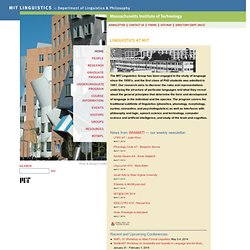
Our research aims to discover the rules and representations underlying the structure of particular languages and what they reveal about the general principles that determine the form and development of language in the individual and the species. The program covers the traditional subfields of linguistics (phonetics, phonology, morphology, syntax, semantics, and psycholinguistics) as well as interfaces with philosophy and logic, speech science and technology, computer science and artificial intelligence, and study of the brain and cognition. AL&T PhD Program. Overview Our doctoral program in Applied Linguistics & Technology was launched in the fall semester of 2005.
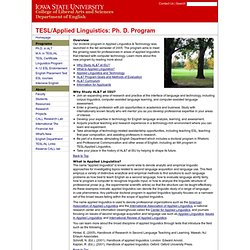
The program aims to meet the growing need for professionals in areas of applied linguistics that intersect with computer technology. Age no excuse for failing to learn a new language - life - 22 July 2011 -... IT'S never too late to learn another language.

Surprisingly, under controlled conditions adults turn out to be better than children at acquiring a new language skill. It is widely believed that children younger than 7 are good at picking up new languages because their brains rewire themselves more easily, and because they use what is called procedural, or implicit, memory to learn - meaning they pick up a new language without giving it conscious thought. Adults are thought to rely on explicit memory, whereby they actively learn the rules of a language. But some linguists now question whether this apparent difference in language-learning ability reflects our attitudes to young children and adults rather than differences in the brain. "If adults make a mistake we don't correct them because we don't want to insult them," says Sara Ferman of Tel Aviv University, Israel. "The adults were consistently better in everything we measured," says Ferman.
More From New Scientist. Big Thinkers: Howard Gardner on Multiple Intelligences. Howard Gardner: We have schools because we hope that someday when children have left schools that they will still be able to use what it is that they've learned.
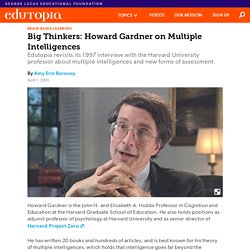
And there is now a massive amount of evidence from all realms of science that unless individuals take a very active role in what it is that they're studying, unless they learn to ask questions, to do things hands-on, to essentially recreate things in their own mind and then transform them as is needed, the ideas just disappear. The student may have a good grade on the exam. We may think that he or she is learning, but a year or two later there's nothing left. La narrativa digital y sus posibilidades.
La narrativa digital o digital storytelling se desarrolló con las cámaras de vídeo, que popularizaron las historias narradas con imágenes y con sonido.
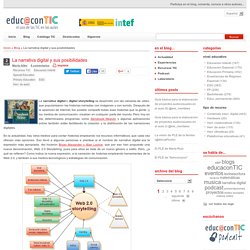
Applied Linguistics. A Summary of Stephen Krashen's "Principles and Practice in Second Language Acquisition" Adquisicion de una segunda lengua. La adquisición de una segunda lengua según Stephen Krashen.
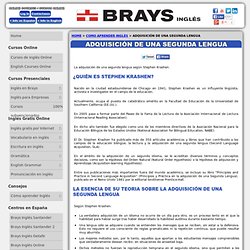
Nacido en la ciudad estadounidense de Chicago en 1941, Stephen Krashen es un influyente lingüista, activista e investigador en el campo de la educación. Actualmente, ocupa el puesto de catedrático emérito en la Facultad de Educación de la Universidad de Southern California (EE.UU.). Foreign Language Education » Teorías sobre la adquisición de una segunda lengua. Es mucho lo que hay que comentar sobre la adquisición de una segunda lengua, muchas personas creen que adquirir una es lo mismo que aprender.

Sin embargo, ambas concepciones son bastante distintas. Aprender un idioma indica una reflexión sobre aquél, además usualmente cuando aprendemos una lengua nueva, esta no es nuestra lengua madre sino una que con los años la vemos necesaria de estudiar. Adquirir un idioma, mientras tanto es hablarlo sin caer en la cuenta que hay un proceso de por medio, este proceso es siempre irreflexivo y por tanto, este idioma ingresa en nuestro cerebro de manera inconciente. Intercultural Communication & Training. English Club. How To Become a Prize-Winning Language Instructor. How To Become a Prize-Winning Language Instructor Plenary presentation to Southeast Regional TESOL Conference October 2, 2005 at Myrtle Beach, South Carolina James J.

Asher, Ph.D. Originator of the Total Physical Response, known worldwide as TPR. Winner of the Outstanding Professor Award from San Jose State University, founded before the Civil War in 1857 as the oldest public university in California. Cooperative Learning. Is a successful teaching strategy in which small teams, each with students of different levels of ability, use a variety of learning activities to improve their understanding of a subject.
Each member of a team is responsible not only for learning what is taught but also for helping teammates learn, thus creating an atmosphere of achievement. Students work through the assignment until all group members successfully understand and complete it. Cooperative efforts result in participants striving for mutual benefit so that all group members: gain from each other's efforts. (Your success benefits me and my success benefits you.) recognize that all group members share a common fate. Know that one's performance is mutually caused by oneself and one's team members. Feel proud and jointly celebrate when a group member is recognized for achievement.